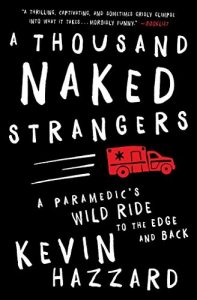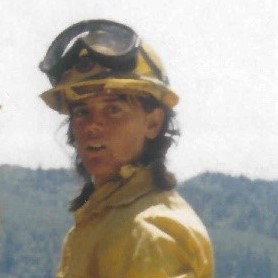
2016
Non-Fiction
$16; 261 pages
Scribner
ISBN: 978-1-5011-1086-3
Ten years on an ambulance in Kevin Hazzard’s A Thousand Naked Strangers
by Clare Frank
The blood-red cartoon ambulance catches my eye. As do the words NAKED and PARAMEDIC. This looks like my kind of book. I was a firefighter for nearly thirty years before I began writing. One of my challenges is finding balance—conveying witnessed trauma with enough grit to honor reality, but not so gratuitously that readers put the book down. Stateside, no one sees more trauma than ambulance paramedics, so I’m curious if this author achieves that balance.
In A Thousand Naked Strangers, author Kevin Hazzard recounts ten years of his life serving as a medic on the streets of Atlanta. He takes us from his early days in medic school to the shady world of code-two ambulance companies (outfits making their money on non-emergency transports), to the real deal—the busiest rig in the seediest parts of Atlanta. This is what he wanted. And this is what will break him.
With a mordant manner, he makes grisly ambulance calls and his path to burnout edgy and enjoyable. His writing background (as a freelance journalist and television writer) is apparent. With exacting word choices, spot-on metaphors, and an eye for dark humor, he creates a distinctive and credible voice. He observes small, absurd details, which makes the otherwise gory moments palatable for those who haven’t chosen a life requiring latex gloves and eye protection. One of his boots makes an irritating scratching sound after a vehicle accident: it’s a piece of skull he can’t dislodge from the lugs. A gunshot wound causes a man’s face to “flop down like congealed cheese off lukewarm pizza.” And when Hazzard gets stuck with a possibly contaminated needle, his boss reaches out, “If you bang your wife tonight? Make sure you double-bag it.” The irreverence is what makes the book funny and keeps the morbidity in check.
But Hazzard delivers more than a collection of adrenaline-fueled tales. He illustrates how his line of work affects those who crave it. It jades. On slow days, he bets on calls and plays “Which car would you want to be hit by in an accident?” And it immortalizes. He and his partner get so good at defeating death, they stop seeing danger. They don’t wait for cops and have to be saved from a riotous crowd. “This is our scariest day on the ambulance. It ends our brief stint as para-gods.” Hazzard owns the truth looming in a joke everyone in the business knows: What’s the difference between God and a paramedic? God doesn’t think he’s a Paramedic. Hazzard is brave enough to take this book in an introspective direction, showing readers casualties on both sides of the rubber gloves.
As memoir should, Hazzard’s story includes personal transformation. But it’s the weakest part of his book. The journey is predictable—from bright-eyed rookie to cynical veteran. Hazzard gives us no peek into his childhood, military school background, or journalism work— no hints about how nature or nurture formed a personality driven towards blood. The last sentence in the book attempts to answer the question, but it feels unsatisfying and perfunctory.
Still, he offers plenty of growth opportunity for readers. In addition to immersing us into a world most see only through Hollywood’s eyes, he has a refreshing subtext. Despite his irreverence, he manages compassion for those in circumstances they can’t get out of. The people he loads on his gurney come in all shapes, sizes, and conditions. A patient tired of cancer treatments leaves the hospital and lands on a park bench where maggots feast on a face sore. A grandma is dying from a broccoli floret no one can dislodge from her throat. Drug dens produce “frequent flyers.” A man nails himself to the wall with a nail gun, so his girlfriend can’t throw him out. A disordered person attempts suicide to flee an alien attack. But to Hazzard, they all bleed red, are having the worst day of their lives, and need someone to care about them in that moment.
This is a fast-paced, compelling story—a book worth reading if for no other reason than it’s an honest account of a world easy to look past, even though chances are everyone will ride in an ambulance at least once. Granted, I’m partial to true stories about emergency services. But well-told ones are a rarity. They tend towards self-congratulation or humorless reportage. Hazzard’s is neither. His book will make you laugh and cringe as you learn about what life looks like from the back of an ambulance. This is the balance I seek.

Clare Frank started firefighting at seventeen and ended up the highest ranking female chief for the State of California. Along the way, she became an arson investigator and attorney. She received an MFA in Creative Writing from Sierra Nevada College, and her memoir is in progress. She lives near Tahoe with her husband and two big dogs.

hi, your site is perfect.Following your articles.